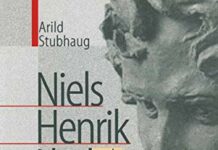
Ebook Info
- Published: 2002
- Number of pages: 566 pages
- Format: PDF
- File Size: 18.09 MB
- Authors: Arild Stubhaug
Description
Sophus Lie (1842-1899) is one of Norways greatest scientific talents. His mathematical works have made him famous around the world no less than Niels Henrik Abel. The terms “Lie groups” and “Lie algebra” are part of the standard mathematical vocabulary. In his comprehensive biography the author Arild Stubhaug introduces us to both the person Sophus Lie and his time. We follow him through: childhood at the vicarage in Nordfjordeid; his youthful years in Moss; education in Christiania; travels in Europe; and learn about his contacts with the leading mathematicians of his time.
User’s Reviews
Reviews from Amazon users which were colected at the time this book was published on the website:
⭐It was hard to choose the star rating. Do I give it a one star for major mathematical disappointment? Or, do I give it a four or five star for a well written history of Norway and Scandinavia? This goes for Adril’s book on Niels Abel as well!The fact is the book(books counting the Abel book) is more about the social and political place of Norway . . . in Scandinavia and Europe in general. I’m sure there’s facts and all, but the books are written more to raise the nationalistic spirit of Norwegians and Scandinavians. It’s even trying to calm the fears of those who cannot/or refuse to try to learn mathematics; the book is full of how yes, they can have sex, and go to parties also. The books contain countless great paintings and stories about Norway and Scandinavian intellectuals far removed from the interests of a mathematician interested in the mathematics of either Niels Abel and Sophus Lie. However factual, these books are borderline propaganda than about the mathematics of the mathematicians.I read E.T Bell and Morris Kline and get criticized by mathematicians for wasting my time with whatever merits they have for a technical history; but, even I find these books of Arild Staubhaug worthless.The Sophus Lie book comes with a nylon string placeholder like you’d see in a Christian Bible!
⭐The Mathematician Sophus Lie: It was the Audacity of My Thinking by Arild StubhaugThis book is similar in style to “Gösta Mittag-Leffler: A Man of Conviction” by the same author. As it does not have a preface it does not specify a target audience to guide potential readers. But it is not for those seeking to appreciate mathematics via the history of an individual mathematician within the intellectual environment of the time or those seeking an informal narrative.”Tracking Him Down: A Torrent of Stories” is an encouraging beginning being a series of anecdotes bought forward from the main text; while the chapter “Into Mathematical History” does explain some of Sophus Lie’s work and his field of study. But these two chapters are not typical of the book. It would be useful to fold back all the useful content of all subsequent chapters into the anecdotes adding some of Sophus Lie’s mathematics and some commentary. After all, his story is worth telling. It was Sophus Lie who said from experience “I think that a Mathematician is comparatively well suited to be in Prison” after being mistaken for a spy on a walk from Paris to Milan.Given that Sophus Lie lectured to the Student Society and his father the Worker’s Academy (as it was later called) the modern reader should demand for the same. “The people’s or worker’s academy movement” we are told “began in England as a popular extension of cultural awakening for the general public and reached Sweden in 1880 …” Let us keep it alive.Mathematicians will retain public support only if those interested (with a smattering of mathematical background) are given an opportunity to appreciate what is going on in their endeavor. It was said of Sophus Lie in 1886 that: And he doth speak a unique Tongue That few can read, and fewer write. `Tis Greek to Folk both old and young And shall scarcely set the World alight. A dialect did Sophus Lie, Of this rare Lingo learn, And joined the tribe of Two or three Who, its Meaning could discern.Yet today’s general audience may understand as much (or perhaps, as little) as a more professional audience. A few diagrams and equations will not scare this audience if informally mixed with the motivation, philosophy, argument, competition, anecdotes, human interest, and humorous perhaps aphoristic exaggerations.Malcolm Cameron3 February 2012
⭐This is a well-written text which has a depth of material about Lie’s life and times. I was hoping it would have the necessary mathematical material as in Ebbinghau’s biography of Zermelo or Yandell’s “The Honor Class.” As one of the reviewer’s wrote, this is not a text to gain an historical persepctive on Lie groups from their inception. That’s unfortunate but for those who are interested in Lie’s life and times, it is a good book.
⭐I received this book in Norwegian as a gift several years ago and have only read it in part, but I can strongly recommend it. The book is thick, it covers Lie’s personal life as well as his mathematical contributions.Lie was born in Nordfjoreid, a small village in Norway just south of the Sunnmøre Alps. He studied and taught at the University of Oslo (UiO), where he was reputed to have jumped out a window after the students locked him in a classroom as prank. He was apparently extreme as Norwegians go. Every Norwegian, more or less, hikes and skis in the mountains from an early age, but Lie is reported to have walked 80 km/day consistently during his years at UiO. He became a friend of Felix Klein early-on. Both were geometers. Lie was arrested and held as German spy while hiking south from Paris toward the Alps during the Franco-Prussian War. He was carrying letters from Klein in German which the French police feared were coded information. When Klein left Leipzig he got Lie the position there. The many volumes with Engel and Scheffers were written there. If you ask a Leipziger today who were Klein and Lie, you will likely be treated with a blank stare. Lie eventually left Leipzig and returned to Oslo.Lie set for himself and answered the question: when is a continuous group of transformations integrable. He thereby constructed Lie algebras as on the road to the answer. Lie algebras arise from following Lie’s path: study a tranformation near the identity. Lie’s work is directly applicable to classical mechanics. My book ‘Classical Mechanics’ has a chapter on Lie groups and uses Lie’s ideas throughout. The extension of the theory of Lie algebras by Cartan has been used heavily in nuclear physics and quantum field theory. The discovery of root diagrams for a Lie algebra provided the system for classifying particles in the SU(3) theory. Modern physics, and our deeper understanding of integrable systems in classical mechanics, would be unthinkable without Lie groups and Lie algebras.
⭐JUST LIKE THE AUTHOR’S EARLIER BOOK ON ABEL THE BOOK FOCUS TOO MUCH ON THE SOCIO-POLITICAL STORIES & OF COURSE THE HUMAN SIDE RATHER THAN THE MATHEMATICIAN.You will learn more about different “Lie Group” than the mathematical “Lie Group”. The ‘Lie Group’ You will learn here is the origin, history of Lie’s family & of course some history of Norway. Although there’s some history of mathematics here & there but that’s not the historical analysis of Lie’s idea or the origin of his thought. It’s just a plain, ‘literal’ history. So if you are a mathematician or somewhat inclined to mathematics & want to see Sophus Lie’s creation of Group transformation & the algebra involved honoured in his name today than this book is not for you. If you are a layman interested in the story of mathematician than this might be it. But a mathematician’s story isn’t that interesting if it’s striped of all the technical details that made him great. Not to mention, the author is no E.T.Bell. Lastly compared to the author’s last book on Abel this book is at least a step up. The Abel biography hardly contains anything about Abel but it’s more about Abel’s family. Here you will get to know about Sophus Lie’s life(although not the intellectual side). So interested laymen can pick this up but for mathematicians this book is passable.
Keywords
Free Download The Mathematician Sophus Lie: It was the Audacity of My Thinking in PDF format
The Mathematician Sophus Lie: It was the Audacity of My Thinking PDF Free Download
Download The Mathematician Sophus Lie: It was the Audacity of My Thinking 2002 PDF Free
The Mathematician Sophus Lie: It was the Audacity of My Thinking 2002 PDF Free Download
Download The Mathematician Sophus Lie: It was the Audacity of My Thinking PDF
Free Download Ebook The Mathematician Sophus Lie: It was the Audacity of My Thinking

